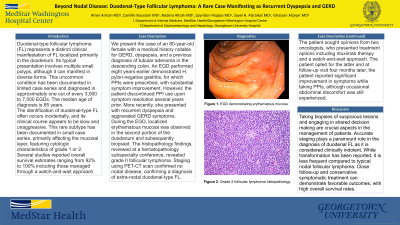Sunday Poster Session
Category: Small Intestine
P1270 - Beyond Nodal Disease: Duodenal-Type Follicular Lymphoma: A Rare Case Manifesting as Recurrent Dyspepsia and GERD
Sunday, October 22, 2023
3:30 PM - 7:00 PM PT
Location: Exhibit Hall

Has Audio

Amer Arman, MD
MedStar Health/Georgetown-Washington Hospital Center
Washington, DC
Presenting Author(s)
Amer Arman, MD1, Camille Boustani, MD2, Nadera Altork, MD1, Spyridon Peppas, MD1, Sayel H. Alzraikat, MD1, Ghassan Alzayer, MD3
1MedStar Health/Georgetown-Washington Hospital Center, Washington, DC; 2MedStar Georgetown University Hospital, Washington, DC; 3MedStar Health/Georgetown University/Washington Hospital Center, Washington, DC
Introduction: Duodenal-type follicular lymphoma (FL) represents a distinct clinical manifestation of FL localized primarily in the duodenum. Its typical presentation involves multiple small polyps, although it can manifest in diverse forms. This uncommon condition has been documented in limited case series and diagnosed in approximately one out of every 3,000 to 7,000 EGDs. The median age of diagnosis is 65 years.
The identification of duodenal-type FL often occurs incidentally, and its clinical course appears to be slow and unaggressive. This rare subtype has been documented in small-scale case series, primarily affecting the mucosal layer, featuring cytologic characteristics of grade 1 or 2. Several studies reported overall survival estimates ranging from 92% to 100% including those managed through a watch-and-wait approach.
Case Description/Methods: We present the case of an 80-year-old female with a medical history notable for gastritis, GERD, and history of tubular adenoma of the descending colon. An EGD performed eight years earlier demonstrated H. pylori-negative gastritis, for which PPIs were prescribed, with substantial improvement of symptoms. However, the patient discontinued PPI use upon symptom resolution several years prior. More recently, she presented with recurrent dyspepsia and aggravated GERD symptoms.
During the EGD, localized erythematous mucosa was observed in the second portion of the duodenum and subsequently biopsied. The histopathology findings, reviewed at a hematopathology subspecialty conference, revealed grade II follicular lymphoma. Staging using PET-CT scan confirmed no nodal disease, confirming a diagnosis of extra-nodal duodenal-type FL.
The patient sought opinions from two oncologists, who presented treatment options including rituximab therapy and a watch-and-wait approach. The patient opted for the latter and at follow-up visit four months later, the patient reported significant improvement in symptoms while taking PPIs, although occasional abdominal discomfort was still experienced.
Discussion: Taking biopsies of suspicious lesions and engaging in shared decision making are crucial aspects in the management of patients. Accurate staging plays a paramount role in the diagnosis of duodenal FL as it is considered clinically indolent. While transformation has been reported, it is less frequent compared to typical nodal follicular lymphoma. Close follow-up and conservative symptomatic treatment can demonstrate favorable outcomes, with high overall survival rates.

Disclosures:
Amer Arman, MD1, Camille Boustani, MD2, Nadera Altork, MD1, Spyridon Peppas, MD1, Sayel H. Alzraikat, MD1, Ghassan Alzayer, MD3. P1270 - Beyond Nodal Disease: Duodenal-Type Follicular Lymphoma: A Rare Case Manifesting as Recurrent Dyspepsia and GERD, ACG 2023 Annual Scientific Meeting Abstracts. Vancouver, BC, Canada: American College of Gastroenterology.
1MedStar Health/Georgetown-Washington Hospital Center, Washington, DC; 2MedStar Georgetown University Hospital, Washington, DC; 3MedStar Health/Georgetown University/Washington Hospital Center, Washington, DC
Introduction: Duodenal-type follicular lymphoma (FL) represents a distinct clinical manifestation of FL localized primarily in the duodenum. Its typical presentation involves multiple small polyps, although it can manifest in diverse forms. This uncommon condition has been documented in limited case series and diagnosed in approximately one out of every 3,000 to 7,000 EGDs. The median age of diagnosis is 65 years.
The identification of duodenal-type FL often occurs incidentally, and its clinical course appears to be slow and unaggressive. This rare subtype has been documented in small-scale case series, primarily affecting the mucosal layer, featuring cytologic characteristics of grade 1 or 2. Several studies reported overall survival estimates ranging from 92% to 100% including those managed through a watch-and-wait approach.
Case Description/Methods: We present the case of an 80-year-old female with a medical history notable for gastritis, GERD, and history of tubular adenoma of the descending colon. An EGD performed eight years earlier demonstrated H. pylori-negative gastritis, for which PPIs were prescribed, with substantial improvement of symptoms. However, the patient discontinued PPI use upon symptom resolution several years prior. More recently, she presented with recurrent dyspepsia and aggravated GERD symptoms.
During the EGD, localized erythematous mucosa was observed in the second portion of the duodenum and subsequently biopsied. The histopathology findings, reviewed at a hematopathology subspecialty conference, revealed grade II follicular lymphoma. Staging using PET-CT scan confirmed no nodal disease, confirming a diagnosis of extra-nodal duodenal-type FL.
The patient sought opinions from two oncologists, who presented treatment options including rituximab therapy and a watch-and-wait approach. The patient opted for the latter and at follow-up visit four months later, the patient reported significant improvement in symptoms while taking PPIs, although occasional abdominal discomfort was still experienced.
Discussion: Taking biopsies of suspicious lesions and engaging in shared decision making are crucial aspects in the management of patients. Accurate staging plays a paramount role in the diagnosis of duodenal FL as it is considered clinically indolent. While transformation has been reported, it is less frequent compared to typical nodal follicular lymphoma. Close follow-up and conservative symptomatic treatment can demonstrate favorable outcomes, with high overall survival rates.

Figure: erythematous duodenum
Disclosures:
Amer Arman indicated no relevant financial relationships.
Camille Boustani indicated no relevant financial relationships.
Nadera Altork indicated no relevant financial relationships.
Spyridon Peppas indicated no relevant financial relationships.
Sayel Alzraikat indicated no relevant financial relationships.
Ghassan Alzayer indicated no relevant financial relationships.
Amer Arman, MD1, Camille Boustani, MD2, Nadera Altork, MD1, Spyridon Peppas, MD1, Sayel H. Alzraikat, MD1, Ghassan Alzayer, MD3. P1270 - Beyond Nodal Disease: Duodenal-Type Follicular Lymphoma: A Rare Case Manifesting as Recurrent Dyspepsia and GERD, ACG 2023 Annual Scientific Meeting Abstracts. Vancouver, BC, Canada: American College of Gastroenterology.
